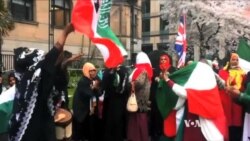LONDON —
A city in Britain has become the first to officially recognize Somaliland’s claim to independence. The vote -- which is purely symbolic and carries no legal weight -- is nevertheless being hailed by Somaliland leaders as a big step forward in their decades-long campaign to break away from Somalia.
Somalilanders celebrated outside Sheffield city hall after the council voted Thursday to recognize the region’s right to self-determination. Thousands of people of Somaliland origin live in the northern British city.
Somaliland’s Foreign Minister Mohamed Bihi Yonis attended the vote; he later told VOA of its symbolic importance. “Somaliland has the border, the population [in favor of independence], the currency, the independence, the elections, the democracy, the rule of law, the human rights record of Somaliland. And I think they have looked into all of those areas and realized that Somaliland has met the requirements of statehood.”
Somaliland occupies the northern section of Somalia.
The rest of the country has been plagued by lawlessness and violence since the overthrow of Somalia’s leader in 1991. Later that same year, Somalilanders voted in a referendum to become independent -- a vote that has not been recognized by any nation.
Oasis of peace
Mohamed Yonis calls Somaliland a relative oasis of peace. “We have a proper functioning government and institutions, while the other part of Somalia is actually burning and having a lot of difficulties as you know -- issues of piracy, terrorism, al-Shabab [Islamic militants].”
Somaliland did gain brief statehood upon its independence from Britain in June 1960. But its government chose to merge with Somalia.
Convincing the world that Somaliland should be recognized as independent will not be easy, according to Alex Vines of London-based policy analyst group Chatham House.
“Internationally, everybody says it would have to be led by Africa," said Vines. "When you talk to African leaders, it’s like, ‘Well, we might consider it, but we wouldn’t be the first.’”
Somaliland authorities insist the region’s economy would support independence.
Thriving economy
The port of Berbera lies just west of the tip of the Horn of Africa. It’s a chaotic, dusty trade hub; camels, goats and sheep are transferred from trucks and carts into the market, to be exported across Africa and the Gulf.
Agriculture is the backbone of Somaliland’s economy; Minister of Livestock Abdi Aw Dahir Ali said the industry can grow even bigger. “It does not export only livestock from Somaliland. Berbera exports livestock from Ethiopia, from Somalia, from Kenya. So it's a center of export of all livestock from the Horn.”
Somaliland authorities have handed out exploration licenses to a number of foreign oil firms, to the anger of the Somali government in Mogadishu.
The country also could offer an export hub for neighboring landlocked Ethiopia, said Vines.
“It wouldn’t be necessarily against the interests of neighboring Ethiopia. But the precedent of recognizing Somaliland would then add complexity to Ethiopia itself,” he said.
Somaliland authorities say talks with the Somali government are progressing. Observers say Mogadishu favors unity, though, and few expect any countries to follow Sheffield’s lead in the near future.
Somalilanders celebrated outside Sheffield city hall after the council voted Thursday to recognize the region’s right to self-determination. Thousands of people of Somaliland origin live in the northern British city.
Somaliland’s Foreign Minister Mohamed Bihi Yonis attended the vote; he later told VOA of its symbolic importance. “Somaliland has the border, the population [in favor of independence], the currency, the independence, the elections, the democracy, the rule of law, the human rights record of Somaliland. And I think they have looked into all of those areas and realized that Somaliland has met the requirements of statehood.”
Somaliland occupies the northern section of Somalia.
The rest of the country has been plagued by lawlessness and violence since the overthrow of Somalia’s leader in 1991. Later that same year, Somalilanders voted in a referendum to become independent -- a vote that has not been recognized by any nation.
Oasis of peace
Mohamed Yonis calls Somaliland a relative oasis of peace. “We have a proper functioning government and institutions, while the other part of Somalia is actually burning and having a lot of difficulties as you know -- issues of piracy, terrorism, al-Shabab [Islamic militants].”
Somaliland did gain brief statehood upon its independence from Britain in June 1960. But its government chose to merge with Somalia.
Convincing the world that Somaliland should be recognized as independent will not be easy, according to Alex Vines of London-based policy analyst group Chatham House.
“Internationally, everybody says it would have to be led by Africa," said Vines. "When you talk to African leaders, it’s like, ‘Well, we might consider it, but we wouldn’t be the first.’”
Somaliland authorities insist the region’s economy would support independence.
Thriving economy
The port of Berbera lies just west of the tip of the Horn of Africa. It’s a chaotic, dusty trade hub; camels, goats and sheep are transferred from trucks and carts into the market, to be exported across Africa and the Gulf.
Agriculture is the backbone of Somaliland’s economy; Minister of Livestock Abdi Aw Dahir Ali said the industry can grow even bigger. “It does not export only livestock from Somaliland. Berbera exports livestock from Ethiopia, from Somalia, from Kenya. So it's a center of export of all livestock from the Horn.”
Somaliland authorities have handed out exploration licenses to a number of foreign oil firms, to the anger of the Somali government in Mogadishu.
The country also could offer an export hub for neighboring landlocked Ethiopia, said Vines.
“It wouldn’t be necessarily against the interests of neighboring Ethiopia. But the precedent of recognizing Somaliland would then add complexity to Ethiopia itself,” he said.
Somaliland authorities say talks with the Somali government are progressing. Observers say Mogadishu favors unity, though, and few expect any countries to follow Sheffield’s lead in the near future.





